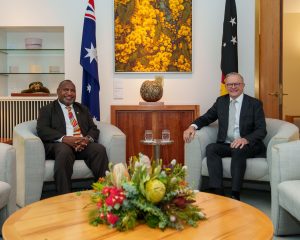Two recent financial deals that seemingly benefit Papua New Guinea indicate the problems at the heart of the country’s political and economic outlook. The separate agreements between PNG and two rival partners, Australia and China, will have some superficial upsides for all parties. But the devil in the details of each arrangement lays bare the stark reality that both countries are getting it wrong, and that all three will likely suffer the consequences.
In April, during Chinese Foreign Minister Wang Yi’s high level visit to Papua New Guinea, the two sides sealed new deals improving PNG’s access to China’s market. In particular, two separate agreements will allow direct exports of PNG’s unroasted coffee and cocoa beans to mainland China. Both governments also pledged to push forward negotiations on a broader free trade agreement.
Calling the agreements “a huge success,” PNG’s Foreign Affairs Minister Justin Tkatchenko boasted that the deals will benefit “over 80 percent of our people that live off the land and [allow] the farmers to become self-reliant.”
The geopolitical underpinnings of the breakthrough are clear. Tkatchenko noted pointedly at the press conference to announce the signing: “I want to take this opportunity to reassure Foreign Minister Wang Yi of Papua New Guinea’s support to the ‘One China’ policy since both countries established diplomatic relations in 1976.”
During Wang’s visit, China and PNG also signed a funding agreement toward information communication technology (ICT) cooperation between the two countries, which continues Beijing’s increasing control over PNG’s communications infrastructure.
For PNG, a “Look North Policy” has redirected its foreign energies away from traditional partners like Australia and New Zealand and toward Asia. It is part of the Marape government’s vision to increase PNG’s economic independence through a wider reach into more lucrative and populated markets.
While Beijing has been following the kind of tied investment and loans and program-aid approach embodied in the latest deals – and in keeping with its aggressively pro-China Belt and Road Initiative – Australia has been taking a different route.
Soon after Wang’s visit to Port Moresby, Australia announced an AU$600 million budgetary assistance package for PNG.
Australia has been willing to prop up PNG’s government coffers in unrestricted aid injections such as this for some time. Over the last four years, Canberra has provided AU$2.56 billion in budget support funds, untied to program or sector outcomes. Each has been a retrospective fix for budgetary shortcomings in PNG’s bottom line the previous year.
Australia’s money has little or no accountability mechanisms, even self-serving ones, and no real Australian private sector involvement.
While both Chinese and Australian approaches are clearly and significantly different, both are in fact joined in terms of their negative outcomes for PNG.
Events this year have provided stark proof.
In January, PNG erupted in a wave of public protest against proposed public service pay cuts and widespread tax rate increases. While the uprising was a reaction to these actions, more general concerns like high unemployment, cost of living, high crime rates, and government corruption were soon referenced. PNG was in a state of emergency for two weeks and at least 22 people were killed in a week of chaos in the country.
Then, on May 24, a devastating landslide in PNG’s Enga province, north of Port Moresby, buried more than 2,000 people from Yambali village.
In contrast to the Marape government’s quick efforts to quell riots in Port Moresby in January, central government action after the landslide was tragically absent. Relief and support were slow to materialize, leading to claims the government was more concerned about ongoing political battles in the capital.
These two examples embody a country in crisis. Even as trade deals are done with Beijing, and government coffers are filled by Canberra’s generous handouts, New Guineans are questioning who is actually benefiting from the supposed progress.
Criticisms not only of the current government, but of the prevailing economic and political system, are building. Many consider the country’s leaders to be interested only in their own power and wealth. Faith in the PNG’s leaders is low.
While Australia and China have very different approaches in PNG, they are united in finding ways to alienate the very people they should be working with: New Guineans themselves.
It’s clear that PNG’s political elite has been distracted by the region’s geostrategic tensions. Like many in the Indo-Pacific region, PNG’s leaders have been caught up in playing one superpower against the other, directly as well as through allies like Australia.
For Australia and its partners in the region, the only sustainable direction is to redress this top-heavy approach. This means working more accountably, transparently, and directly with the people of PNG and devising ways to bring them and Australians together. Unless major powers like Australia, and local regional governments like PNG’s, can get back to the business of actual government and leadership, the region, as well as specific populations will suffer.
For Canberra, a “Third Way,” favoring a people-centered relationship between Australians and New Guineans will almost certainly provide not only greater regional stability but plenty of popular support too.
But that would require new thinking, and that is a rare commodity in the current Indo-Pacific environment.

































